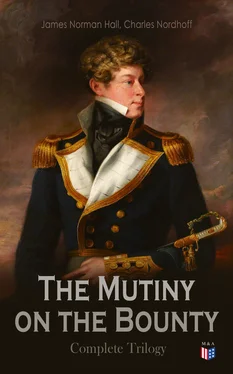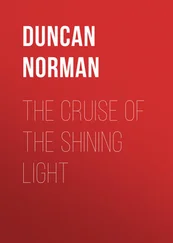One evening, greatly to my surprise, he sent for me to sup with him. The afterpart of the great cabin had been partitioned off for his use, and there I found him, seated at his table, with a copy of one of Captain Cook’s charts outspread before him. He greeted me with formal politeness, but when he had dismissed the sentinel stationed outside and had closed the door, he fell back into the old friendly manner customary between us before the mutiny.
“I have asked you to sup with me, Byam,” he said, “but you need not accept unless you choose.”
I responded, against my inclination, to his friendly overtures. I had come to resent bitterly the ruin he had brought upon us all; but under the influence of his appealing kindly manner I found my indignation melting away. I stood before Fletcher Christian, my friend, not the mutineer who had cast nineteen men adrift in a small boat thousands of miles from home. To those who blame me I can merely say that they never knew the man.
He was in great need of someone to whom he could unburden his thoughts, and I had not been five minutes in his cabin before he was speaking of the mutiny.
“When I think of Bligh,” he said, “I have no regrets. None whatever. I have suffered too much at his hands ever to care what his fate may be. But for those who went with him....”
He shut his eyes tightly and pressed his knuckles against them, as though to blot from his mind the picture of the small open boat, filled, almost to the point of foundering, with innocent men. Such desolation of heart was apparent in his voice and the expression on his face that I pitied him deeply. I knew that he would never know peace again—never until his last day. He begged me to profit by his example and never act upon impulse, and for all my sympathy I could not avoid saying that a mutiny so carefully and secretly planned could hardly be called an act of impulse.
“Good God!” he exclaimed. “Did you think it was planned? Ten minutes before Bligh was seized I had no more thought of mutiny than you yourself. Had it been an act of deliberation.... Is it possible that you could have believed it?”
“What else could I think?” I replied. “It happened in your watch. When I was awakened by Churchill I found you in complete possession of the ship, with armed men stationed at the hatchways and all about the decks. It is inconceivable to me that all this could have happened without prearrangement.”
“And yet it did,” Christian replied, earnestly. “It was all the work of five minutes. Let me tell you.... Do you remember the talk we had the night before, during Peckover’s watch?”
“Perfectly.”
“I asked that, in case anything happened to me during the voyage home, you would explain the circumstances to my people when you reached England. My reason for speaking of this matter was that I planned to leave the ship before the morning watch. I had taken no one into my confidence except the quartermaster, John Norton, a man whom I knew I could trust. I was not willing that you should know. I wanted to spare your feelings until I had gone, and it was certain that you would have tried to dissuade me. Norton had managed to make, secretly, a tiny raft upon which I hoped to reach the island of Tofoa. With the sea as calm as it was, I had every reason to think that I could make the land.”
“You really meant to cut yourself off for all time from home and friends?”
“Yes. I was in hell, Byam! I had suffered from Bligh’s tyranny to the limit of my endurance. When he accused me, that same afternoon, with stealing his coconuts, I felt that I could bear no more.”
“I know,” I said; “you were sorely tried, but we were all in the same sorry situation with you.”
“I didn’t think of that. I thought only of the shame of the accusation; of the contemptible, sordid meanness of the man who could bring such a charge against his officers. I thought as well of the long voyage ahead of us, and I knew that I could not and would not endure another year of such torment.
“But luck was against me. The calmness and beauty of the night, so favourable otherwise to my purpose, were against me. As you know, most of the ship’s company were on deck and, almost becalmed as we were, it would have been impossible to slip away unseen. At last I decided that the plan would have to be abandoned, temporarily at least. I should have to wait until we passed some other island farther to the westward.
“Even at four o’clock, when I took charge of the deck from Peckover, the thought of mutiny had not occurred to me. Believe this; I assure you that it is true. I paced up and down for some time, brooding over the repeated insults I had received from Bligh. I don’t defend myself; I merely relate the facts. I was in a mood to kill the man. Yes, that thought crossed my mind more than once: why not murder him and be done with it? The temptation was all but overpowering. This will give you an indication of the state of my feelings at that time. I was, in sober truth, out of my mind.
“As you know, Hayward was the mate of my watch. In order to regain control of myself I went in search of him, and found him stretched out in the lee of the cutter, asleep. At another time such neglect of duty would have aroused my anger. We were in unknown waters, and Bligh had rightly given orders that the strictest watch should be kept, no matter how far we might be from land. Hayward was in charge of the forward deck, and three of the men, taking their cue from him, were asleep. I stood for a moment looking down at Hayward, and then, as plainly as though they had been spoken, I heard the words, ‘Seize the ship.’
“From that moment my brain worked with the utmost clearness and precision. It appeared to function outside of me; I had only to obey its commands. I realized what an opportunity had presented itself, but not at all the wrong I should be doing the rest of you. Burkitt was awake, standing in the waist by the bulwarks on the larboard side. He had been frequently punished by Bligh and I knew that I could count on his help, but I didn’t reveal my plan then—for I now had a plan. I asked him to come below with me and waken Churchill, Martin, Thompson, and Quintal, without disturbing anyone else, and to tell them I wanted to see them at the fore ladderway. Meanwhile I went to Coleman’s hammock, roused him quietly, and asked for the key to the arms chest, saying that I wanted a musket to shoot a shark. He gave it to me, turned over in his hammock, and fell asleep again.
“I found Hallet asleep on the arms chest. As he was also of my watch, I roused him with a show of anger and set him on deck by the after ladderway. He was badly frightened at being caught, and begged me in a low voice to say nothing of the matter to Captain Bligh. Burkitt and the men he had awakened were awaiting me. They fell in at once with my plan. We provided ourselves with muskets and pistols, and I placed Thompson sentinel over the arms chest. We then roused McCoy, Williams, Alexander Smith, and others, every man of them promising his hearty support. They were given arms, and when I had placed sentinels at the hatchways we went to Bligh’s cabin. The rest you know.”
He fell silent and sat for some time with his head in his hands, staring at the deck between his feet. At length I forced myself to say, “What chance do you think Bligh has of reaching England?”
“Little enough. Timor is the nearest place where they could expect help. It is twelve hundred leagues from the place where the launch was cast adrift.... When I seized the ship my only thought was that I would carry Bligh home in irons. The men wouldn’t have it; you saw that for yourself. I was forced to give way on that point. Then came the question of who was to go with him. My plan was, at first, to send only Fryer, Samuel, Hallet, and Hayward, but I could not refuse to let any others go with him who wished to; in fact, not to have done so would have been highly dangerous. Fryer, Purcell, Cole, and Peckover would, I knew, make every effort to form a party for retaking the ship, if kept with us.... Well, enough of this. What is done can’t be undone. I now have to think of the men who are with me. The least I can do is to prevent them from being taken.”
Читать дальше











